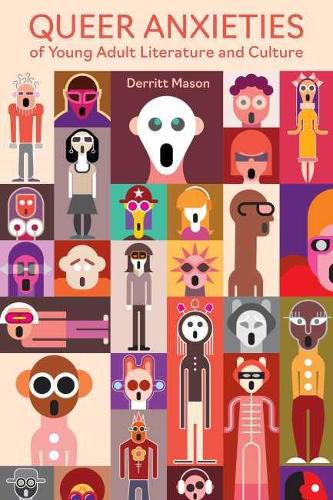Readings Newsletter
Become a Readings Member to make your shopping experience even easier.
Sign in or sign up for free!
You’re not far away from qualifying for FREE standard shipping within Australia
You’ve qualified for FREE standard shipping within Australia
The cart is loading…






This title is printed to order. This book may have been self-published. If so, we cannot guarantee the quality of the content. In the main most books will have gone through the editing process however some may not. We therefore suggest that you be aware of this before ordering this book. If in doubt check either the author or publisher’s details as we are unable to accept any returns unless they are faulty. Please contact us if you have any questions.
Young adult literature featuring LGBTQ characters is booming. In the 1980s and 1990s, only a handful of such titles were published every year. Recently, these numbers have soared to over one hundred annual releases. Queer characters are also appearing more frequently in film, on television, and in video games. This explosion of queer representation, however, has prompted new forms of longstanding cultural anxieties about adolescent sexuality. What makes for a good coming out story? Will increased queer representation in young people’s media teach adolescents the right lessons and help queer teens live better, happier lives? What if these stories harm young people instead of helping them?
In Queer Anxieties of Young Adult Literature and Culture, Derritt Mason considers these questions through a range of popular media, including an assortment of young adult books; Caper in the Castro, the first-ever queer video game; online fan communities; and popular television series Glee and Big Mouth. Mason argues themes that generate the most anxiety about adolescent culture - queer visibility, risk taking, HIV/AIDS, dystopia and horror, and the promise that It Gets Better and the threat that it might not - challenge us to rethink how we read and engage with young people’s media. Instead of imagining queer young adult literature as a subgenre defined by its visibly queer characters, Mason proposes that we see queer YA as a body of transmedia texts with blurry boundaries, one that coheres around affect - specifically, anxiety - instead of content.
$9.00 standard shipping within Australia
FREE standard shipping within Australia for orders over $100.00
Express & International shipping calculated at checkout
This title is printed to order. This book may have been self-published. If so, we cannot guarantee the quality of the content. In the main most books will have gone through the editing process however some may not. We therefore suggest that you be aware of this before ordering this book. If in doubt check either the author or publisher’s details as we are unable to accept any returns unless they are faulty. Please contact us if you have any questions.
Young adult literature featuring LGBTQ characters is booming. In the 1980s and 1990s, only a handful of such titles were published every year. Recently, these numbers have soared to over one hundred annual releases. Queer characters are also appearing more frequently in film, on television, and in video games. This explosion of queer representation, however, has prompted new forms of longstanding cultural anxieties about adolescent sexuality. What makes for a good coming out story? Will increased queer representation in young people’s media teach adolescents the right lessons and help queer teens live better, happier lives? What if these stories harm young people instead of helping them?
In Queer Anxieties of Young Adult Literature and Culture, Derritt Mason considers these questions through a range of popular media, including an assortment of young adult books; Caper in the Castro, the first-ever queer video game; online fan communities; and popular television series Glee and Big Mouth. Mason argues themes that generate the most anxiety about adolescent culture - queer visibility, risk taking, HIV/AIDS, dystopia and horror, and the promise that It Gets Better and the threat that it might not - challenge us to rethink how we read and engage with young people’s media. Instead of imagining queer young adult literature as a subgenre defined by its visibly queer characters, Mason proposes that we see queer YA as a body of transmedia texts with blurry boundaries, one that coheres around affect - specifically, anxiety - instead of content.